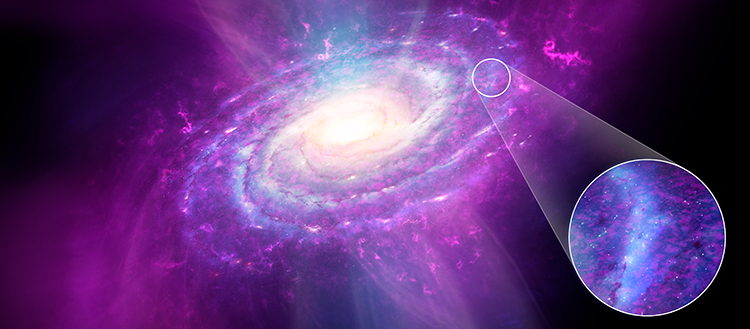Our Milky Way galaxy isn't very well mixed, study suggests

Our galaxy isn't as thoroughly mixed as scientists sometimes assume, according to a new study.
In particular, that new research focuses on the distribution of what astronomers regard as metals — which is really just every element besides hydrogen and helium, even when these elements are gases. In the new work, scientists used the Hubble Space Telescope and the Very Large Telescope in Chile to map the metal in dust across the Milky Way in hopes of improving models describing the galaxy's history.
"Initially, when the Milky Way was formed, more than 10 billion years ago, it had no metals," Annalisa De Cia, an astronomer at the University of Geneva in Switzerland and lead author on the new research, said in a statement. "The stars gradually enriched the environment with the metals they produced."
Related: Wow! This incredible image of the Milky Way took 12 years to create
That enrichment occurs because, deep inside a star's core, atoms smash together to slowly form increasingly heavy types of matter, all the way up through iron. Not all stars explode when they run out of the material that fuels that process, but the stars that do go boom toss all those metals out into their cosmic neighborhoods, where, theoretically, the metals can mix in with the rest of the Milky Way.
And traditionally, scientific models have assumed that the mixing process is pretty effective, according to the statement. The new observations, which targeted dust near 25 different stars, suggest that might not be the case and that instead, there are stark local differences in metal levels.
As a result, scientists may need to reevaluate their understanding of the Milky Way's history, the researchers said.
Get the Space.com Newsletter
Breaking space news, the latest updates on rocket launches, skywatching events and more!
The research is described in a paper published Wednesday (Sept. 8) in the journal Nature.
Email Meghan Bartels at mbartels@space.com or follow her on Twitter @meghanbartels. Follow us on Twitter @Spacedotcom and on Facebook.
Join our Space Forums to keep talking space on the latest missions, night sky and more! And if you have a news tip, correction or comment, let us know at: community@space.com.

Meghan is a senior writer at Space.com and has more than five years' experience as a science journalist based in New York City. She joined Space.com in July 2018, with previous writing published in outlets including Newsweek and Audubon. Meghan earned an MA in science journalism from New York University and a BA in classics from Georgetown University, and in her free time she enjoys reading and visiting museums. Follow her on Twitter at @meghanbartels.









